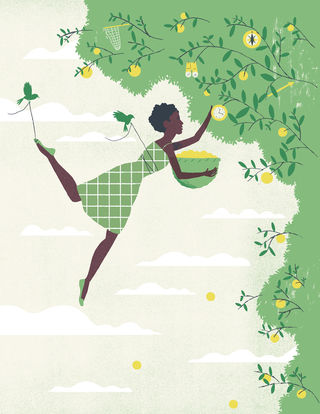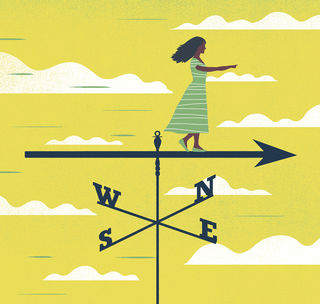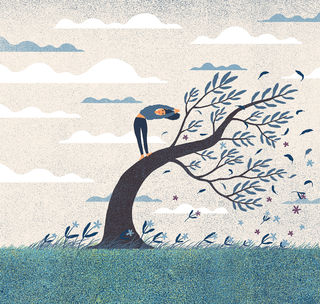16 Life Lessons
Refracting their own personal experiences through the lens of professional expertise, 16 behavioral scientists extract wisdom for living a satisfying life—from the need for spontaneity to guarding against regret.
By PT Staff published September 5, 2016 - last reviewed on June 13, 2017

At the heart of wisdom lies a paradox. On the one hand, our homegrown instincts about the world can be deeply flawed; the bias built into each of us is exactly what the methods of science are designed to overcome. At the same time, wisdom proceeds directly from personal, lived experience. With these two forces in mind, PT sought life lessons from leading behavioral scientists, those whose expertise encompasses both. In this article, you will likely glimpse something personal about each of the contributors—but also encounter valuable counsel for a meaningful life.
SHAPING YOUR LIFE
When Life Issues an Invitation, Accept
Spontaneity is the best antidote to fear and habit.
by Joachim I. Krueger
Life offers opportunities to live spontaneously. Spontaneity, in my view, is the answer to fear and habit, both of which are part of our repertoire but should not dominate. Fear and habit hold us back and make us predictable. Spontaneity opens the door to creativity and happiness, in part because of the unpredictability it brings.
Spontaneity is not impulsivity, which reflects excess energy and poor judgment. Nor is it the same as randomness. Random behavior is not a response to an invitation by the environment appealing to some readiness within us. Spontaneity means that we say yes to an opportunity to act with a view toward an experiential gain, without worrying whether it might feel good.
Socialization and acculturation promote the interests of the group or society. Their interest is that we behave "well" and predictably. From the social perspective, spontaneity is a nuisance. In contrast, the organism (you and me) has an intrinsic interest in getting to know its own potential. This goal can be met only by exploration and experimentation. The organism has to forage for experience, as it were, enjoy it as much as possible, and learn from it.
A spontaneous (but not impulsive or randomly acting) person remains mindful of the interests of others and potential long-term dangers to his or her own well-being. Spontaneity is not unreasonable. That's why it is so surprising that many of us, after leaving childhood, fail to realize its full promise.
Spontaneity can be recovered and nurtured in small steps. Do not only take a different route when walking home, but also be ready to stop, smell the flowers, or talk to a stranger. The deepest knowledge is the realization that you don't know what good may come of it.
Don't Hold Back
Change demands full-on commitment.
by Peter Kramer
When I came to skiing, in my mid-30s, the quality of instruction astounded me, at least at first. I am unathletic, and yet group lessons catapulted me to what skiers call "the intermediate plateau." I could make my way down most trails, albeit gracelessly.
Progressing further was no easy matter. The problem, instructors said, was that I was still "in the back seat," holding my weight up the mountain. I needed to commit, to trust my skis, to let them carve.
I understood the problem deeply, bodily. Fear made me cheat.
Getting out of the back seat became a central image for me. Discussing intimacy, I rely on skiing metaphors. Patients can contribute to a relationship in a dozen ways and still manage to frustrate their partner. Considering recovery from depression, in my new book, Ordinarily Well, I write of skiing and what it takes to get in balance. My model is a patient who aims to do everything right at once: "quit street drugs, stop hooking up with uncaring guys, wake with the lark, eat healthy foods, unplug the television, practice yoga, attend church, take the prescribed medicine regularly, and speak honestly with me."
Writing is another area where commitment matters. Editors red-pencil adjectives and circle long sentences. Making small changes is never enough. What's needed is to confront self-indulgence overall, embracing—willingly—the directive to "murder your darlings." The writer's commitment is to the whole project: pacing, voice, precision of meaning, the fictive dream.
For every attempt everyone makes at self-correction, we will fall short. But it helps, as skiing teaches, to try—to apply the will not just to this task but to the whole project, to facing the fear and letting go.

Value A Little Compulsion
The drive to discover brings deep satisfaction.
by Joe Herbert
Call it that Monday morning feeling: Most others drag themselves to work—but we research scientists can't wait to get in.
Why do research? Our subject intrigues us so we want to know more about it, to fill in the obvious gaps in knowledge. When we have an opportunity to do some research, we find ourselves working all day and night. Not because anyone makes us but simply because we want to.
There are dangers. Scientists become obsessed with a subject: We need to be, because prolonged thinking is the way to discovery. This doesn't always make us good at being marriage partners or family people or interesting dinner guests. We won't admit it, but we'd rather be in the lab or writing that critical paper.
Most scientists don't become rich. In the West, most of us live reasonably enough, although there are rocky moments—a grant turned down, experiments that don't work; someone else publishing results first.
On balance, we live lives of deep satisfaction. And we understand the compulsion that drives musicians, artists, writers. They create, we discover.
Zig When the World Zags
If nobody is upset, you're doing something wrong.
by Todd Kashdan
I devote my life to understanding and enhancing well-being in the world. Because I study multiple topics at the same time, ideas bleed into each other and creativity is maximized.
Our brains are designed to create, not hold onto, content. It is essential to extract information and file it away into easily retrievable documents. I keep an electronic diary on my computer plus a physical notebook in every cranny of my house. When possible, I also "outsource" tasks that require self-control, tying daily activities to environmental triggers. Automated routines increase my efficiency—paradoxically offering the greatest space for serendipity.
My list of failures in all life domains is endless. The first year I applied to graduate school, I was rejected by 16 out of 17. (But the second year, I received a $30,000 fellowship.) When my manuscripts are rejected, I reflect on the feedback for a few hours, then integrate what is useful. It is easier to bounce back from adversity when you are doing work that is profoundly meaningful.
When it comes to the work, if nobody is upset, you are doing something wrong. I search for the areas that nobody else is looking at—which sometimes leads to creative contributions, sometimes to dead ends. If you zig when nearly everyone else zags, you are going to upset somebody. This is the currency of rebelliousness.
FACING ADVERSITY
Expect the Unexpected—and Make Peace with It
Life is unpredictable.
by Toni Bernhard
Expect the unexpected. And when that unexpected is not to your liking but you cannot change it, make peace with it.
Fifteen years ago, the unexpected happened to me. A seemingly acute viral infection turned into a chronic illness. At the time, I was on the faculty at the University of California Davis School of Law and was active in my community.
This unexpected turn forced me to trade the classroom and the world outside for life inside my house, often in bed. I was angry and filled with self-blame. It took me years to realize that the battle I was waging against what I could not change was only adding mental anguish to the physical suffering.
This realization encouraged me to take a realistic look at the human condition, including the unpredictable nature of life and the lack of control over much that happens. It wasn't easy to confront these facts head-on, but in the end, it was liberating: It changed the focus of my attention from what my life had once been to how it was now, and this enabled me to build a new life.
I started by cultivating self-compassion. Instead of using my mental energy to fight my new situation, I learned to speak kindly to myself—the way I'd speak to a loved one in need of comfort. And so I might say, "It's hard to miss so many special occasions."
When I began to treat myself kindly, something surprising happened. Not only did my mental suffering ease, but I was able to see possibilities in the life I did have. From my bed, I began to study classical music. I started growing bonsai trees indoors. And I began to write about chronic pain and illness to try to help others in my situation. It gave my life purpose again.
A verse from the Tao Te Ching reads: "A tree that cannot bend will crack in the wind." Expecting the unexpected allows you to weather life's storms without breaking.
Practice the Art of Under-Reacting
A zen perspective helps balance the bad and the best.
by Douglas Kenrick
At a conference on culture and psychology 20 years ago, a cultural psychologist from China told a story that she thought captured the zen perspective on life. It's worth hearing if you have ever confronted experiences in which it seemed that the worst of luck had befallen you.
There was a farmer who woke up one morning to find that a wild horse had wandered onto his farm. He captured the horse, and his neighbors came over to congratulate him on his amazing good luck. He simply shrugged his shoulders. The next day, his son tried to ride the horse but was violently thrown and broke his leg in several places. The neighbors came by to offer their condolences on this stroke of bad luck. The farmer simply shrugged his shoulders. The next day, the army marched through and conscripted all the young men to go off to fight a war in a distant province. Because his son had been injured, he was spared. The farmer's neighbors came by to congratulate him on his good fortune. He again shrugged.
The lesson is, of course, not to over-react—to either the bad or the good things that happen to you. If your lover jilts you, or you lose a job, is that insufferably bad? Do you really want to stay where you are not wanted? Maybe you'll find a relationship or a job that is a better fit for you. But when you find a great new relationship or a great new job, avoid thinking that all your troubles are over. Every relationship involves costs. Every job has costs as well.

Stop. Worrying. Now.
Worry is not only futile, it poisons the present.
by Karl Andrew Pillemer
Confession: I am a world-class worrier. Give me some free mental space and I can fill it easily with concerns large and small.
But I learned a lesson that has made it much easier to achieve a fret-free state (at least some of the time). Over the past 10 years, I've been interviewing hundreds of older people about the advice they would like to pass on to younger people. One question I've asked is, "What can young people do to avoid having regrets in later years?"
I expected to hear about big-ticket items like affairs and shady business deals. I did not expect that our elders would have this recommendation: Stop worrying.
Over and over as they reflected on their lives, I heard versions of "I wish I'd spent less time worrying" and "I regret that I worried so much about everything." Indeed, from the vantage point of late life, many people felt that if given a do-over, they would like to have all the time back they spent poisoning the present moment with fruitless rumination about the future.
Older people are fine with planning. What they want us to stop is the repetitive, pointless rumination about things we can't change. In their view, life is just too short to waste it by worrying about events we can't control. Marie, 82, made the point clearly: "I learned that there were going to be layoffs in my company. I ruined the next three months worrying about my job, even though I could do nothing about it." She paused. "At this point in my life, I wish I had those three months back!"
Now when I start down the rabbit hole of mindless rumination about problems big and small, I think of the elders' advice. I imagine 1,500 grandparents yelling at me: "Worry wastes your precious lifetime, so stop it!"
I now sometimes succeed in turning off the mind-churning worry. And if I can do it, anyone can!
Always Carry a Sense of Humor
Wit takes you from victim to victor over Life's Ugliness.
by Regina Barreca
Keep a sense of humor on you at all times. Using humor leads to recuperation, restoration, and redemption; often the worst moments can transform themselves into the funniest stories. Humor allows you to get your spiritual deposit back from periods of tragedy, betrayal, loss, and fear. It is emotional recycling at its best. Once you make an event into a story, it's no longer just something that happened to you. You control it. If you hone it to a fine point, humor can be the instrument you use to pick the lock of pretty much anything that's trying to keep you out.
TAKE CHARGE OF TIME
Do It While You Can
Every moment is the right moment for anything.
by Tim Pychyl
On April 3, 1968, at the Mason Temple in Memphis, Tennessee, Martin Luther King delivered what is known as the "Mountaintop Speech." I had no idea that King's message went far beyond the civil rights for which, the day after, he made the ultimate sacrifice.
My colleague, James Crooks, a philosopher at Bishop's University in Quebec, uses the Mountaintop Speech to contrast two ways of thinking about time: Aristotle's thinking on the ancient Greek notion of chronos (time in the abstract, time as process or sequence) and kairos (the right moment, the point of crisis or opportunity) as revealed in Heidegger. The difference profoundly affects how we live our lives.
When we conceive of time in the abstract, objectifying time, one moment seems as good as the next. This perspective allows us to play a shell game of procrastination, where the promise of a future time quells the anxiety of the present, so we move our intention to act to tomorrow.
Kairos speaks to an embodiment of time in our lives, not some abstraction. It can be seen in the alcoholic who, after years of denial, finally stands up in an AA meeting and looks her past and its consequences squarely in the face. Or in the initiative of the middle-age man who resolves to subject himself to the discipline of exercise and dietary reform after years of having let such things slide.
Resolve, reconciliation, uniting past and future in the present moment: No shell game here.
King knew there was danger ahead as he spoke at the Mason Temple, but as he said so simply, "We are going on!" It was the right moment.
My father, now 87 and acquainted with the temporality of life, recently offered me this advice: "Do it while you can." There is no abstract conception of time in this—only the time that we have. Every moment is a moment in which both future and past are at stake; every moment is the decisive moment, the right moment.
Consider the Opportunities You Will One Day Kick Yourself for Missing
Time travel can enrich your life now.
by Art Markman
Reading psychology research about regret has ushered many transcendent moments into my life. Studies by Tom Gilovich and colleagues demonstrate that there are big differences between what older and younger people regret. Younger people often regret actions they have taken that were embarrassing or got them into trouble—cheating on tests, asking out a romantic interest and being turned down.
In contrast, the biggest regrets of adults in their 70s and 80s are the actions they did not take—never learning to swing dance or not switching careers when they had a chance.
When young, people are prone to avoid risks and potential failures in the belief that they will rue any bad outcomes. As a result, they miss out on opportunities that, as an older adult, they will regret not having pursued.
It is helpful for younger adults to deploy the mental capacity to travel in time. Imagine yourself at an advanced age and think back on your life. Consider the experiences that the older you will likely regret not having had. Then, work toward having those experiences while you are still young enough to do so.
In my 30s, I realized that I would regret not learning to play the saxophone. I started lessons, hoping to be a decent player in 10 years. Fifteen years on, I play in a band and have had many transcendent experiences I would never have had if I had not learned what people come to regret.
Take the Long View
Present identities are shaped by whom we hope to become.
by Susan Krause Whitbourne
At some point you will be formulating a narrative of your past life. Project it outward to the future you, perhaps age 45 or 50.
What story will you tell about yourself at that time? Will you wish that you'd left your partner when you had the first inkling that something wasn't right? If you've put off having children, and then never did, will you feel that your life is missing an important piece when you could have become a grandparent?
Our identity in the present is shaped in part by our view of the person we hope to become. By checking in on that future perspective, especially when big decisions come your way, your hoped-for self can become the self you achieve.

Respect Your Future Self
Setbacks are no reason to jettison belief in yourself.
by Glenn Geher
When you look back, you'll find out that much of your life turned out differently from your plan. Random encounters shape your life a bit. And there are always setbacks.
You need to be open to the fact that, when it comes to your future, anything can happen. So don't sell yourself short. And realize that failure is part of the deal in life.
Regardless of what's happened in the past, expect that you'll be able to succeed in the future. Give your future self (the person that you'll turn into) the benefit of the doubt.
Overcoming failure and genuinely believing in yourself is a winning combination.
In teaching university students—who often do not do well with failure—I have found that my own story can be pretty instructive. I started out a very ho-hum undergraduate at the University of Connecticut, then the
No. 6 party school in the country, a ranking I felt obligated to uphold. I saw my share of failure. But at some point, I realized I was at school for a different reason and hit the books. I graduated with a 3.22 GPA, good enough to have some doors open for me.
Armed with a Ph.D., I'm now chair of a great academic department, have an amazing team of research students, and regularly publish our work. I'm writing my seventh book.
Still, I can count far more failures than successes—jobs I didn't get (still waiting for that call, Harvard!), research projects that didn't make it, grant applications that got roasted. I've truly come to thrive on failure. Expect failure, learn from it, smile at it—and move forward anyway.
EMBRACE EXPERIENCE
Don't Just Look—Observe
Words are not necessarily enough for understanding.
by Joe Navarro
When Fidel Castro took over Cuba in 1959, my family fled as refugees. Not émigrés, for we always wanted to go back. Fortunately the United States welcomed us as exiles. For me, a child, not knowing English was a hindrance, but also a blessing, because it taught me to observe.
Not just to look but to observe. How do people talk? At what distance? What do I need to do to make and keep friends? Who likes me? Who portends ill? Whom did I have to avoid? How do you make friends out of enemies? What is too close when talking? What is too loud?
What do I do when I don't understand the rules of basketball, volleyball, kickball, or tennis? Whom should I hang around with and whom should I avoid? When they sing "Mary had a little lamb," what should I do: I don't know who this Mary is, and what is the point of the song? I had much curiosity and many questions.
I learned to rely on a universal language, one I had encountered before, in Cuba—body language.
No matter what people said, I knew I could rely on nonverbal communications to guide me. You quickly learn who likes you and who tolerates you, but more important, who doesn't like you and may cause you harm. You learn whom you can relax with and who you must guard against because they don't like new kids, or maybe, just maybe, they don't like this foreigner, who can't speak English.
Life instructs and catastrophes instruct with permanence. Early on, I began to observe and catalog what people felt, thought, intended, or desired through their nonverbal communication. It allowed me to deal with my new American reality and to help my parents. It also helped later in my career as an FBI Special Agent (a job that is primarily people-watching).
Lived Experience Is a Fine Teacher
There's only one way to learn how to be a parent.
by Jonathan Wai
Creating something from nothing, going from 0 to 1, is fresh, unfamiliar, and hard to do. For me, becoming a father, in the sense of learning to take care of my son, was like a new creation.
Poor Richard's Almanack claims that "Experience keeps a dear school, but fools will learn in no other." As a person who has spent much of his life trying to gather wisdom from the minds and words of others, from the day my first son was born I've felt like a lost fool, resorting to trial and error to stumble my way through fatherhood.
At the start, my son seemed to need his mom, and I didn't know how to connect with him. But my wife was working crazy hours in a medical residency. I took parental leave, and for two years, my son and I spent a lot of face-to-face time together. Little by little, we found our way. To this day he still seeks me for comfort. We share a deep bond formed in the crucible of those long hours. He may not remember those moments when he grows up, but I will cherish how he took me from 0 to 1 and taught me to be a father.
Only when I became a parent did I understand my own parents—and especially why my mother kept seeing me as a child and telling me what to do. When a parent sees a grown child, they also experience an emotional time continuum—all the years and memories that came before.

Comfort Is Overrated
Prioritizing feelings can foreclose major accomplishments.
by Jean Twenge
Not long ago, I asked a graduate teaching assistant to give a guest lecture. "But I'm not comfortable talking in front of that many people," she said.
At first, I was flabbergasted. What was she doing in a program that often leads to a teaching job? Then I remembered: She is part of a generation reared to believe that feelings are paramount and that life requires trigger warnings.
Like many things, these ideas grew from good intentions—combating prejudice. But they came to mean that no one should ever feel uncomfortable.
This is a counterproductive, even dangerous, notion. We cannot be protected from every risk and challenge. If we were, we'd never learn anything. The best way to get comfortable—and good—at something is to do it, even in the presence of severe phobias. Research shows that immediate exposure to a feared
experience is the best treatment.
As a graduate student, I was devastated when my papers were rejected by academic journals. It seemed like a condemnation of my choice of a profession. I thought it wouldn't happen once I'd "made it." I've now published more than 120 papers, and most still get rejected on the first try. I'm no longer devastated by rejections—but I am not comfortable when they arrive. Nor was I comfortable writing my first book. It was a struggle.
But if my papers sailed through the review process, they would be worse. If I had decided to quit while writing the book, or not start it at all, I would have been more comfortable in the moment—but missed the opportunities it opened.
If you are comfortable, you are not learning. Feeling uncomfortable is not a reason to reject an opportunity. It's a reason to embrace it.
Set Goals That Can Be Met
We never outgrow the need to sharpen our game.
by Ronald Riggio
Those of us who study psychology as a profession run the risk of not putting the lessons of psychology into practice. I plead guilty, although at some point, I stopped being a hypocrite.
First, to counter my habit of settling for good enough, I applied the research on goal-setting to my life and career. I set goals that were specific, measurable, achievable, realistic, and time-bound. For example, I decided that I wanted to gain tenure at a specific age and laid out the tasks needed to achieve it.
I also used cognitive psychology to tackle my insomnia. Rather than lying in bed ruminating, I got up and worked until I was tired. My expectation that eight uninterrupted hours of sleep is required was a big part of the problem.
To curb my social anxiety, I marshaled a combination of cognitive strategies and communication skills I was studying—how to express or control emotions properly, how to make small talk, how to actively listen, and more.
I had the inside track on psychological knowledge. But it can be understood—and applied—by anyone.
Submit your response to this story to letters@psychologytoday.com. If you would like us to consider your letter for publication, please include your name, city, and state. Letters may be edited for length and clarity.
For more stories like this one, subscribe to Psychology Today, where this piece originally appeared.
Facebook image: Tinxi/Shutterstock
